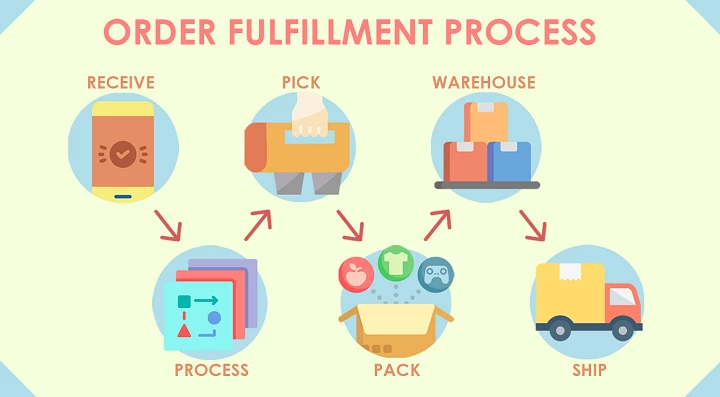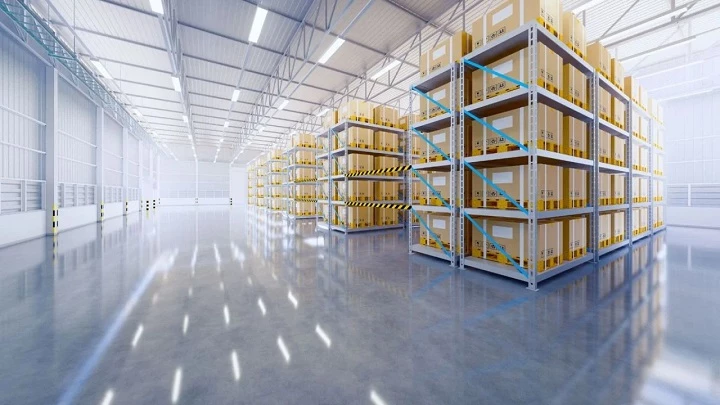


What is Fulfillment Service? How is the process?
Fulfillment is considered the optimal solution to the logistics problem of businessmen. With this service, businesses ship goods quickly, save costs, and manage inventory more effectively. So what is Fulfillment, and how does it work? Find out in the following article.
1. What is Fulfillment?
Fulfillment is an order fulfillment service that includes many activities, such as picking from the seller, warehousing, order processing, selecting from the warehouse, packing, and shipping to the customer. Fulfillment services can be operated by itself or through an intermediary. However, the core point is to handle goods systematically and transparently, ensuring business efficiency.

2. Who is the Fulfillment service for?
The Fulfillment service is suitable for any industry that ships, packs, labels, or invoices goods.
For example: In the field of e-commerce, businesses sell on e-commerce platforms such as Tiki, Shopee, Lazada, and Sendo. Units and individuals also do business on social networks or with import-export companies.
3. Types of Fulfillment
There are currently three types of Fulfillment services. Depending on the size and human resources, businesses choose the appropriate form:
3.1. In-house Fulfillment
In-house Fulfillment is also known as Self-fulfillment. The feature of this form is that it has its warehouse, and the business will perform the activities of inventory management, processing, and order fulfillment.
In-house Fulfillment is suitable for businesses such as:
- Large enterprises with large budgets for investment in warehousing, hiring staff, operating the management and transportation of goods.
- Small businesses, new to the company have a small number of customers and orders so that they can perform management and transportation activities themselves.
3.2. Dropshipping
A dropship is a form of Fulfillment where the business unit does not own the goods. Instead, they will contact the supplier to ship it to the consignee.
Dropship is suitable for businesses dealing in a variety of items, having little capital, and not wanting to be directly involved in managing and transporting goods.
3.3. Outsourced Fulfillment
Outsourced Fulfillment is a form where a 3rd party will do the management and shipping activities. The business will hire a company specializing in Fulfillment to perform the entire process of receiving, storing, and labeling goods. , packing, shipping, and collecting money. Accordingly, the Fulfillment company will be responsible for the activities related to the interests, even if problems arise.
Outsourced Fulfillment is suitable for businesses that do not have enough resources to handle goods and need 3rd party support to make operations faster and more efficient.

4. Benefits of Fulfillment
Here are four benefits that businesses get when using Fulfillment services:
4.1. Effective cost saving
Enterprises can spend a little money on an investment in facilities and human resources to manage goods-related activities, thereby saving costs and optimizing budgets for businesses.
4.2. Enhance the quality of customer service
In addition to handling the entire process related to goods, the fulfillment company also provides 24/7 customer support services via email, chatbox, ticket issues, etc. If there is a problem with the goods, the customer Customers can respond to the company to be resolved quickly.
4.3. Business expansion
With the help of the Fulfillment service, the cargo management and shipping process is completed, ensuring customer satisfaction. Therefore, enterprises can expand their business scale, not only in the country but also in foreign markets, and reach more customers.
4.4. Faster shipping times
A fulfillment company is also essential in ensuring the issues of receiving, storing, packaging, labeling, and shipping. Accordingly, the Fulfillment company often cooperates with reputable shipping partners, helping goods be shipped quickly, to the right place, and on time. Some companies also have warehouses and Fulfillment centers in many countries to help shorten shipping times.
5. How does the Fulfillment service work?
Typically, Fulfillment service takes place with the following five steps:
Step 1: Receive goods from the business unit.
Fulfillment employees will directly go to the business to receive goods for storage.
Step 2: Manage goods in the warehouse.
Upon arrival at the Fulfillment company's warehouse, the goods will be carefully arranged in the warehouses. At the same time, the staff will also perform inventory and regularly monitor the number of goods in and out.
Step 3: Receive and process orders.
After receiving and confirming the order, the Fulfillment center will start picking, counting, quality checking, packing, and stamping. A separate management system controls The order processing process, which helps limit errors and ensure punctuality.
Step 4: Export and ship the goods.
Once the goods have been packed and stamped, the company will carry out the delivery process, check the quantity, put the interest on the vehicle, and ship them to the customer at the correct address and time as committed.
Step 5: Perform verification and processing of after-sales requests.
After successfully shipping the goods, the Fulfillment company will receive and process the customer's requests and questions. For example, damaged goods, incorrect goods shipped, and customers wanting to return goods.
6. Why should you choose InterLOG to experience Fulfillment service?
InterLOG is a logistics service provider with nearly 20 years of experience, accompanying many domestic and foreign businesses. In particular, the Fulfillment service with a modern warehouse management system and large-scale infrastructure at InterLOG is trusted by many customers.
The outstanding features of Fulfillment service at InterLOG:
- The staff has extensive experience in warehouse management and distribution. Complete professional Fulfillment process, ensuring close coordination between stages, from storage, loading, and unloading to order Fulfillment and inventory management.
- Diverse warehousing ecosystems located in a critical location, the global warehouse network helps optimize transit time and costs for customers.
- Warehouse management system with complete and modern equipment, ensuring close monitoring and good warehouse management for customers.
- Competitive Fulfillment costs, tailored to the client's finances.
- Provide various solutions for cargo maintenance, insurance, and fire prevention systems to maintain the quality and safety of goods.

Contact InterLOG for detailed advice and quotation on Fulfillment service HERE!
The above article has provided answers to the question of what Fulfillment is, as well as common forms and operating procedures. Fulfillment is a comprehensive solution that helps businesses save time and costs in management, freight and improve business efficiency.


